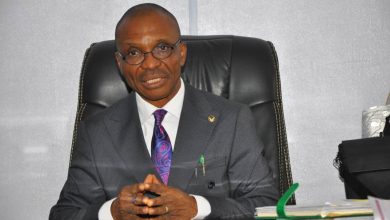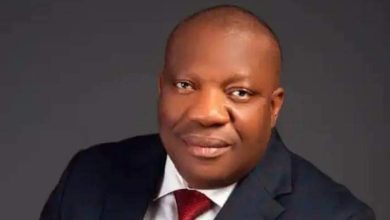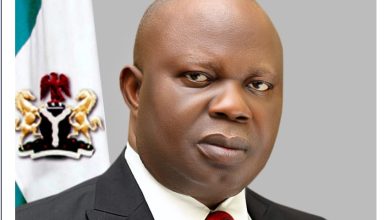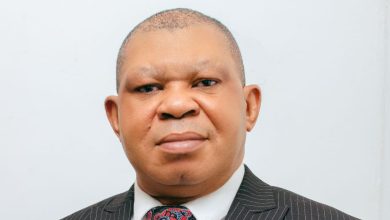In Nigeria, We Play Politics Of Convenience
...Policy Should Drive Politics For A Healthy Democracy
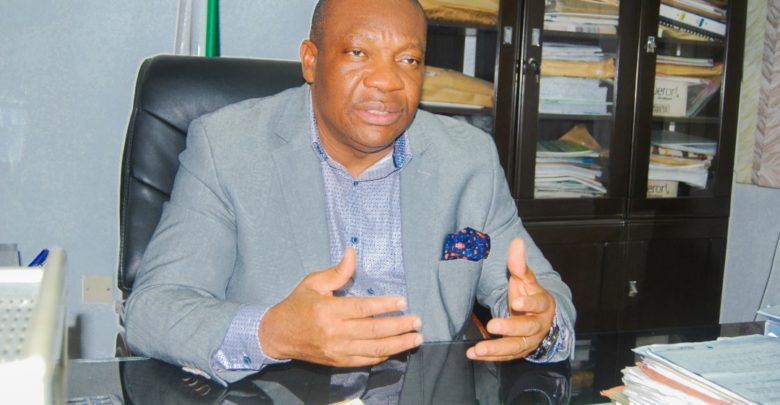
….A Judiciary Lacking The Confidence Of The People Is In Trouble
….Gov Emmanuel Is A Smart Politician
…Those Who Underrated Him Should Have A Rethink
Suave, cerebral and witty, Ekong Sampson, Ph. D is a serving Commissioner in Akwa Ibom State in charge of Environment and Petroleum Resources.
Given to a life of diligence, Sampson, a journalist, lawyer, politician and administrator has etched his name glowingly on the public space wherever he has served. Such distinctive lifestyle has seen him serve as a two-term chairman of Mkpat Enin Local Government Area and a two-term member, Akwa Ibom State House of Assembly, where he earned the sobriquets of political “Junction” of Mkpat Enin and the “Compendium” of the Assembly respectively.
In the Akwa Ibom State Executive Council, Sampson has served at various positions: Commissioner for Rural Development; Special Adviser, Legislative Affairs and Water Resources and presently overseeing Environment and Petroleum Resources. Very unassuming, the legal luminary has remained one of the intellectual power-houses of the present administration.
Over the years, he has established himself as a motivational speaker, reputable writer and author with several publications to his credit. A servant-leader and grassroots mobilizer, Sampson in his quest for knowledge and academic excellence recently bagged a doctorate degree in law and intends to write more books and perhaps return to the classroom someday to impact knowledge to others, especially the younger generation.
As a leader whose heart flows with the milk of human kindness, Sampson’s tenure as chairman, Mkpat Enin Local Government Area remains unparalleled with several life-touching projects and other forms of empowerment of his people.
In this exclusive interview with Crystal Express, he speaks on a wide range of contemporary issues. Excerpts:
How prepared is Akwa Ibom State for the next rainy season, considering the disastrous effects of flood and erosions witnessed in the past years?
Akwa Ibom State Government is committed to ensuring that our environment is safe. The governor, Mr. Udom Emmanuel, is environment-friendly and he is concerned about the erosion and flood menace in the state. The state government has partnership with the World Bank and through this partnership an intervention is going on in the state presently. More are coming which will soon be made public. I can happily tell you that a major intervention is coming on IBB Avenue in Uyo, which is a major road in the state with high traffic. The building process has been completed and we are waiting for the World Bank to give its no objection and work will resume on permanent basis on IBB Avenue. The erosion control project there is a huge intervention spanning 7.5 kilometers and stretching up to Ibesikpo Asutan Council area. Once that work is completed, there will be a lot of relief from Atiku Abubakar Road flooding, C Division of the Nigerian Police flooding and, of course, the Idondesit Nkanga State Secretariat axis down to Ibesikpo. Work has commenced in earnest at Etim Umana down to Anua in the project being done by the state government in partnership with the World Bank. Residents of those areas are very happy. We have taken time to catalogue the impact of gully erosion in the state and discovered that Akwa Ibom State has over 1000 gully erosion sites. This is a big concern to the state and that is why I have persistently called on the Federal Government to recognize Akwa Ibom as a peculiar case and assist the state accordingly. Akwa Ibom State has done so much for Nigeria and Nigeria needs Akwa Ibom because of our peaceful nature and other natural endowments. However, the state government is not resting on its oars in ensuring that the problems created by these natural disasters are well addressed.
With the scope of intervention planned for IBB Avenue, have the project consultants considered the massive damage to homes and farmlands in the process and planned adequate compensations?
There have been comprehensive evaluations of the proposed project. The World Bank is a very thorough institution and major concerns have been evaluated. What is important now is that at the end of the day, there will be a permanent solution to the IBB Avenue saga.
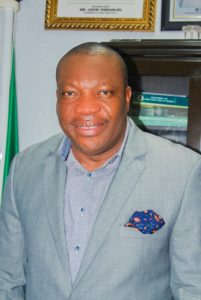
What is government doing to address the issues of the over 1000 active erosion sites across the state, knowing the implication of lack of intervention?
That is one of the reasons we are appealing for the intervention of the Federal Government and other key institutions. Akwa Ibom as a state means a lot to Nigeria and even international community, owing to her endowments which are so vast. If Akwa Ibom is under pressure then Nigeria is under pressure. So, it becomes natural that the Federal Government and key institutions see Akwa Ibom as a peculiar case and assist appropriately. If the Federal Government can partner the state on these problems, they will be permanently addressed.
Recently you threw more light and made advocacy on the benefits of wetlands which hitherto were seen as a curse rather than blessing in our communities. Please could you explain more on it?
Wetlands are parcels of lands that store water over a long period of time and it may be permanent or seasonal. Few years ago, when we celebrated World Wetlands Day, I was on the radio to talk about wetlands. In some parts of the state and country, wetlands are involved with superstitious beliefs and all manner of evil, juju and even mermaids. But wetland is part of the natural ecosystem. In Akwa Ibom State, we are committed to turning wetlands into wealth lands.
That dominated our recent engagements on World’s Wetlands Day. As a government, we are committed to exploring the potentials in wetlands and convert the waste to wealth. We can use wetlands to promote agriculture in addition to tourism and culture. We are gathering data on wetlands in the state. The intrusion of climate change has had a toll on wetland. So we are gathering our data and thinking too how we can explore and exploit these wetlands to make money. We made it clear that our communities will use wetlands to drive their farming endeavours. You know that when a community feeds from its natural phenomenon, it can also drive tourism. These are areas hitherto ignored when people talked about wetlands. In my ministry we do a lot of advocacy and we have brought communities to buy into the environment. Just last week, I was at the airport road to address the crowd of illegal traders there that there is nothing wrong with one eking a living but trading illegally along a super highway is a short cut to the grave because motorists racing along the airport road only have eyes on the aircraft and not on the illegal traders. They are in a race against time to catch up a flight which must be boarded before departure. I told them they could get hit and die and the truth is that dead men don’t hawk. I also visited the traditional rulers in that location and appealed to them to tell their people to vacate the airport highways and return to nearby markets and do their trading. So, sometimes you have to embark on this advocacy in the interest of the people and at times too, you have to save people from themselves. As a commissioner, I have had cause to embark on advocacy aimed at rescuing people from untimely death. Airport road is a high traffic location and people must acknowledge it. We do a lot of advocacy and this is the same thing we are doing with the advantages of the wetlands as many people do not know that there are a lot of potentials in wetland, especially as we are very committed to agriculture and food efficiency.
Dredging of sand is one problem that has threatened bridges and environment in many communities across the state and government has tried to regulate such activities. What is the situation now?
As I speak, we have just returned from some communities in Ibesikpo Asutan Local Government Area where I engaged the people on the issue. I told them that sand mining is dangerous. It affects the health of the environment, causes erosion and leads to the vanishing of communities; that they may wake up one day and find out that they are no longer in existence. Some of the activities that our communities drive are inherently against their interest like a community neck deep in illegal dredging will soon wake up to see that they are no longer part of this earth. Again, in case of massive flood and landslides in such communities, who will they blame? We are carrying out a number of advocacies among our communities and in the next few days we are going to undertake serious enforcements on the state government directives against illegal dredging. We have to act to protect the environment and our people. One must make out a living but not to the detriment of the environment. We are the major contributors to the problems of the environment as we have seen through illegal dredging.
How does your ministry control the excavations done at borrow pits operated by road constructions firms to ensure they do not constitute environmental havoc in future?
We do call contractors to meetings and intensify engagements with them. In the same vein, we talk to the leaders of the communities and warn them against encouraging any undue exploitation of the environment. Some communities sell off their lands for peanuts that are not commensurate with the impact of the exploitation on their environment. We are talking to our communities to restrict them from selling off their land for any illegal sand mining or dredging activities, because at the end of the day, it is the communities that will suffer when the contractors vacate with their money. Such communities suffer untold problems of flood, erosion and a times landslides. By the time the damage they have inflicted on themselves dawns on them, the perpetrators would no longer be in the picture. Business men like road contractors are only interested in their profit, which is why we need to do a lot of advocacy on this matter too. Thus using my background as a journalist, I have been reaching out. We need to connect with the people and whenever I served, I connect with the people, get them to buy into what government is doing because every government policy directly affects the people.
Still on environment, the world is going from waste to wealth. When will Akwa Ibom State that generates so much waste start converting them to wealth?
I must tell you that we have a number of investors we are engaging on this matter. Our key exploration now is how to convert waste to wealth. We are engaging experts on it and the solution will soon come on stream.
As a lawyer of many years in practice, what is your take on the Supreme Court judgment in Imo in which a sitting government was sacked for someone who came a distant fourth?
I do not agree with the premises with which that judgment was erected. But I believe that there is a window because former Governor Emeka Ihediora has approached the Supreme Court to revisit the case. People are wondering if the Supreme Court, as a final arbiter in any case, can overruled itself. They believe that once the court pronounces judgment on any matter, it is final and asking the court to overrule itself is an impossibility. But if these commentators have read my book, The Path of Justice Chike Idigbe, they would have been better informed. The Supreme Court can overrule itself in appropriate cases. The Supreme Court is admittedly a final court but they are made up of human beings. In a clear case of per curium as we say in law when a decision manifestly upsets the very foundation of law and jurisprudence, then the Supreme Court is at liberty to review its mind and ensure that justice is done. The Supreme Court is final but they are human and we err as human beings and when we err, the dictates of sound judgement persuades us to review the circumstances we find ourselves. So in appropriate cases, the Supreme Court can review its mind and its judgement. The Ihedioha case presents a good circumstance when the Supreme Court is persuaded to review its mind. If you read one of my several books, The Path of Justice Chike Idigbe, you will see instances where the Supreme Court has been seen to review its mind.
Does it not sound funny for a court of that level to revise its own self on an already decided case?
The Supreme Court is made up of human beings and mere mortals. Only God is perfect and immune from mistakes. Supreme Court justices are highly learned and very powerful but mortals. They are just like any of us too. Kayode Esho, one of the very best that sat on the bench of the Supreme Court made it clear that the Supreme Court was a super court in one of the cases he handled and I agree entirely but they are human beings. Before I joined active politics, I had cause to interact with a number of very senior judges in the court and I have written books on some of them. My books highlight what I term, the circumstances of a judge’s mind, such as my book on Sir Louis Mbanefo, Justice Udo Udoma and my research on Esho and others. I was one of the few journalists in Nigeria who spoke extensively with Chief Rotimi Williams who was one of the very best and quintessential of legal knowledge. I spent days with him at his Ilupeju law office and residence. I was a young lawyer at the time and you could see the workings of the mind of a legal genius. I have also interacted with the very best that the bench in Nigeria has produced, very influential legal minds but all are human beings prone to errors and prone ultimately to the review of legal mind. So, the fact that the Supreme Court is the super court which we all refer to and hold in reverence doesn’t mean that in some circumstances, its mind cannot be looked into. The Supreme Court can look into its mind and mete out justice most especially in circumstances things occur and there is a ground swell of legal opinion that justice should be done. The most important thing is that we must have confidence in our judiciary. A judiciary that doesn’t have the confidence of the people is in trouble.
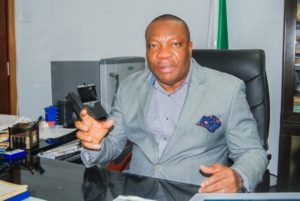
As we are talking, virtually all the lawmakers elected on the platform of the People’s Democratic Party (PDP) in Imo State have defected to the new governor’s All Progressives Congress (APC). As a lawyer, what do you advise PDP to do in this circumstance?
The law is very clear on the sanctions that go with such defections. Defections in Nigeria are politicized and part of why I get worried sometimes is that in Nigeria, we play politics of convenience. We support a jaundiced position when it favours us and attack it when it does not. We play politics of convenience but I must tell you that a wrong decision favours nobody. If it favours you today, you become the victim of the same wrong position tomorrow. In Nigeria we drive against the moral traffic and that is why we have a lot of problems. We look for convenience as a shortcut to prominence and we politicise virtually everything. When I was at the Political Affairs Bureau as special adviser, I drafted an advocacy that policy should drive politics and should not be the other way round. In Nigeria, politics drives policy and it should not be. Policy should drive politics for us to have a healthy democracy. That way, we will build and nurture strong institutions. Without strong institutions, our democracy is engendered, just like a weak economy puts pressure on democracy. Defection on the surface is played out as a tool to belong and people clap. A manifestly wrong procedure favours nobody. If you celebrate a wrong procedure today as a beneficiary, the next day you will become victim of wrong procedure. I am worried that we celebrate the path of convenience than path of permanence. When something favours us, we clap, even when it comes from wrong procedure not minding that we may later become captives of such procedures. I spoke somewhere at a function that some Nigerians who are celebrating the hate speech bill may be the first victim of its fangs when it is passed into law, and accented to by Mr. President. In Nigeria, we hardly look into the future but the convenience of the moment which is unhealthy for democracy and the people. I’ll rather walk the narrow path and stand with the great future ahead.
Looking at the general insecurity in the country and the setting up of the regional security in the south west named “Amotekun”, do you think that Nigeria is ripe for state police?
Nigeria is long overdue for state police. The extent of insecurity in Nigeria today is alarming. I have been very consistent that Nigeria is long overdue for community policing. When I was a commissioner for rural development, I conceptualised Akwa Ibom rural development master plan which, probably, was the first in Nigeria. Part of the master plan contains component of rural security. Rural security is underrated in Nigeria. How can you fight crime without rural component of policing? How do we gather intelligence? How do we generate data? We live in a country that sometimes we feel, we can gloss over problems. Community is a ready intervention that will help to fight crime in Nigeria and I have been vocal and consistent in this position. We need the kind of security architecture that will permeate the nooks and crannies of this country; the type of security architecture that is acceptable and challenges the people to see security as their business and concern. Our present security architecture disconnects them and leaves them with I don’t care attitude. The implication is that the information will be suppressed and too much pressure will go to the centre. But if the security architecture is decentralized, the people will see themselves as part of the components. People will be more supportive. The tragedy of the Nigerian security network is that everybody minds his own business. It doesn’t happen like that in climes where people see security as a common concern and help in intelligent gathering among other contributions because it is in their own interest. If you don’t secure the rural environment, how can you truly secure the urban city? I am a strong campaigner for community policing. I believe it will take off pressure from the centre and make everybody partake in security system and it is long overdue for Nigeria to have community policing.
You equally served as chairman of Mkpat Enin Local Government twice and left some marks. Today, council chairmen only pay salaries without doing anything else. What can be done to bring council back to the path of development and progress?
The local government as structured is constitutionally and politically supposed to be closest to the grassroots. A properly framed and organized local government administration is a super boost to community policing and will accelerate rural development. That is to say that the role of the local government cannot be overemphasized and does not remove the fact that there are challenges that are caused by the people the same system is supposed to protect. People put a lot of pressure on local government chairmen. When I was in the House of Assembly, I chaired a committee that made far reaching reforms for the local government administration in the state. I brought those reforms through a bill that was passed by the House of Assembly but was not accented to by the then governor. If my recommendations had become law, there would have been some changes.
The committee was made up of all former council chairmen then in the State House of Assembly. They brought their experience to bear and made very useful recommendations. I was happy when the state assembly passed the bill into law. We took time to look at how the system can be more productive. I personally don’t see why a local government chairman should not live in his council area. I lived in Mkpat Enin throughout my tenure as chairman for four years among my people.
I withstood the pressure of living in the village. But as I said, public service is sacrifice. If you don’t have the zeal to sacrifice for the people, you have no business being in public service. You must expect blackmail too and if you are afraid of that, you don’t come near public service. I have been a victim of blackmail too. I also want to appeal to our people to allow the system to run. Local government goes through a lot of pressure. The councilors are also chased around. I am not defending the council officials but just calling on our people to allow the system function. The operators of our local government system should also know that they are there to serve. They should emulate Governor Udom Emmanuel who is working very hard to ensure that Akwa Ibom State is taken into the prosperous future. I am very impressed with the strides being recorded by my chairman in Mkpat Enin Council Area where the council administration is diversifying. We have a shoe manufacturing factory in Mkpat Enin.
The council administration undertakes oil and gas training for our youths. These are investing into the future. A number of other council areas are also working. I am not saying that it is perfect but there has to be some competition for the system to run better.
How have the international oil companies (IOC’s) partnered your ministry to ensure a better deal for the communities they are operating?
Akwa Ibom is the biggest oil producing state in Nigeria today. We are happy for this milestone. At the Ministry of Environment and Petroleum, we engage the IOC’s and other companies and explore areas of partnership. As we speak we are looking at the memorandum of understanding (MoU) some of the host communities entered into with oil companies. Some of the MoU’s are nothing to write home about. We are appealing to our communities not to jump into agreements which will ultimately not favour them. We are looking at the MoU’s to ensure that they are standardized. This is important to ensure that people are not shortchanged in the long run. Oil politics is a very complicated web because high stakes are involved. If you are not careful while chasing peanuts, you can throw your community into eternal jeopardy. There are a lot of dialogues going on now. We have called for restraint by our communities when going into agreements. The state government is fully aware of our entitlements as a major oil producing state in the country. The government will always ensure that the rights of the oil bearing communities are protected. It is important that the rights of Akwa Ibom people are protected. At the same time, the state government is poised to ensuring that the oil companies have a conducive environment to operate. They are here for business and their business must be encouraged while the rights of our people and environment are also protected. That is what I am committed to doing as the honourable Commissioner for Environment and Petroleum Resources.
You noted that Akwa Ibom is the highest producer of oil. Does the state also enjoy corresponding federal projects and attention?
You can see for yourself if the Federal Government has been fair to the state. The state government does everything. I told you earlier that Akwa Ibom has over 1000 erosion sites. The state government is left to bear the burden alone. Akwa Ibom makes enormous contributions to Nigeria and the leadership of the country should be fairer to us.
You have worked with Governor Udom Emmanuel as a commissioner. What is his working relationship with his team?
Governor Udom Emmanuel is a very focused leader. He is very intelligent. Luckily, I have worked with other great Nigerians with such qualities. I have worked with Senator Udoma Udo Udoma. Working with Governor Emmanuel has been a rich experience for me. He is an intellectual and that makes it easier for me. I function better when I am in an intellectual environment. I also connect with the masses readily. Governor Emmanuel is passionate about developing Akwa Ibom State. He is very serious about attitudinal re-orientation which was the reason he came up with the Dakkada philosophy, a rousing sentiment challenging our people to soul searching. He is very innovative and courageous. Governor Emmanuel is a smart politician. Those who underrated him may need to have a rethink. Look at his efforts in diversifying the flanks of the economy. That is investing in the future beyond oil. The intelligent building erected by Governor Emmanuel shows an active mind at work. The governor believes with magnificent structure, it will be easier to attract investment to the state. Ibom Air has been a radical and revolutionary advertisement of the Akwa Ibom genius. Governor Emmanuel has won for Akwa Ibom State the respect of Nigeria. There is nobody who flies Ibom Air that doesn’t regard Akwa Ibom State. By the time Ibom Deep Seaport takes off, you would have seen the part of vision and the strength of courage in governor Udom Emmanuel. It takes a leader with great vision to drive these unique and life changing projects. Agriculture and sports are also faring well in the state. We have had it so good in sports with two football teams in our elite league. Our athletes are doing very well across the nation and the world. Sports is a dynamic investment and with Governor Emmanuel’s effort Akwa Ibom will be the Mecca of sports in no distant time in Nigeria, if not Africa.
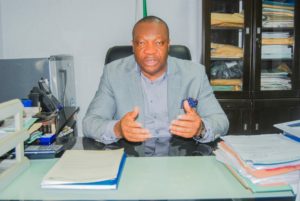
I have discovered through several books written by you that you are in love with writing. When did you discover this talent of yours?
I started writing from the age of 15 and I will write till my last day on earth. I love writing because it soothes nerves. Even in difficult times when I start to write or think about writing, my problem gets solved. God uses my pen to comfort me. Remember that at a point, I was in detention for a month during my incarceration along with some elders in Mkpat Enin over a political event in my local government area. I wrote a part of one of my books from Uyo Prisons. To me, writing is a balm which makes me happy. I love research scholarship and that is why I did not come across as a typical political conjecture. I am Ekong Sampson, lawyer, writer and servant of the people.
Your rise in politics is phenomenal; from council chairman to State House of Assembly and eventually to the state executive council with different portfolios. What accounts for the success?
God is the secret. I have always been appreciative of God’s love and benevolence upon my life. His grace is enormous in my life but in between is my belief, that wherever I find myself I put in my best. If you have no plan or capacity to sacrifice for the benefit of others, then you have no business being in public service. I am enormously grateful to God for His mercies and I also thank Governor Emmanuel for the opportunity and other leaders who found me worthy and were very helpful to me. Life is a school. My experience in public life is like a lesson in a university. My earlier foundations in life and service have been quite helpful. When I was working with Senator Udoma, the issues surrounding the onshore/offshore dichotomy was in top gear and I learnt a lot. When I was chairman of Mkpat Enin Council Area, I did my best to serve my people. I built a lot of infrastructure. I constructed Mkpat Enin hall, rural electrification, graded roads, renovated schools, provided portable water and constructed a divisional police station/headquarter, market stalls and empowered several people. I championed the construction of the PDP office in Mkpat Enin which probably is the first in the state. We have a functional party office. I initiated the idea and contributed enormously to the project. Before I became a council chairman some of the wards were not in PDP but under my tenure I ensured that all the wards were PDP. That record has continued till today. I was the co-ordinator of Divine Mandate in the 2019 election and am happy we won massively. My unit result for PDP was probably the highest in the state. You could see that I led from the front. I thank other stakeholders in Mkpat Enin who worked with me to ensure that we won convincingly. Mkpat Enin has consistently given Governor Emmanuel the highest number of votes during party primaries. We will continue to support the governor. I also served as a chairman of the monitoring and evaluation committee of the Divine Mandate
2023 politics is already in the air. Do you think it is too early for people to start canvassing for support?
Politicking is part of democracy. But I think the drum beats for 2023 are coming too early. People should rather support the completion agenda for the governor to succeed.

